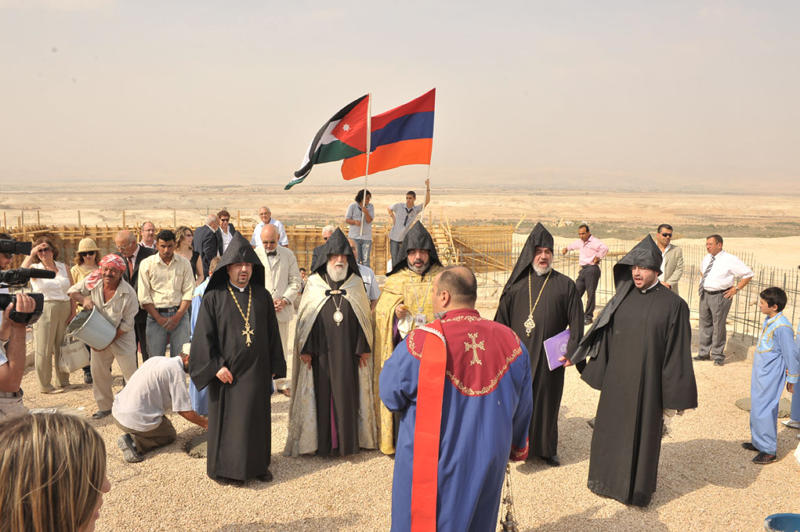Armenians Lay Cornerstone for New Church on Jordan River
11/20/2009
Category: File News (November 2009)
AMMAN, Jordan — Long ago, in an age when it seemed life was simpler and uncomplicated, and innocence still possible, the River Jordan was a roaring torrent, barreling its way through the inhospitable Judean wilderness towards the shores of the Dead Sea where nothing was said to live, despite the infusion of the fresh waters.
As it sang along its path, the river gathered into its bosom the seasonal gift of rainwater cascading down the towering cliffs. And for countless years bands of hermits and other religious zealots eked out a precarious existence in the caves dotted around the landscape.
Unlike the Son of Man, Jesus of Nazareth, who had no place to lay down his head, the hermits, who had denounced the world and all its vanities, had a place in those caves to call home.
Within a stone’s throw of these enclaves, another group of zealots, the Essenes, had labored to create their own community, firm in their dedication to the God whose name they held too sacred to pronounce.
In their stronghold, they would defy even the awesome might and power of the Roman Empire, bent on their persecution.
The Essenes left behind a library of priceless manuscripts whose secrets have not all been deciphered yet, but the Christian monks remained poor record-keepers: they left practically nothing for posterity, their only bequest the bowels of their caves which would be transformed into shrines or chapels for countless pious seekers who had braved the long trek from Jerusalem and Jericho.
The sands of time, and the occasional earthquake, have shifted the crumbling edifices into oblivion, but the Christian church has not forgotten the legacy of those first followers of Christ.
And to commemorate the memory of those holy men and of their Messiah and the Baptist who preceded him, churches soon began to sprout along the sides of the River Jordan. Alas, few of the old churches — they would have been modest structures — survived the centuries.
But the legacy remained, reinforced by the determination of the Christian church to perpetuate the memory of the events that transpired there two millennia ago.
The drive gathered pace in recent years as the various Christian denominations in the Holy Land moved to make amends for years of neglect, buoyed by the munificence of the Hashemite Kingdom of Jordan and its Western-educated king who has donated the land and granted the permits for the construction of new churches along the eastern shores of the Jordan River.
The Greek Orthodox Patriarchate of Jerusalem church wasted no time laying down the foundations for a new church there — and the Armenians followed soon after.
But when the Armenian Patriarchate of Jerusalem received the nod from Jordan to stake their claim to the land the Royal court had made available to it, its finances were still on shaky ground and it found it difficult to embark on any construction at the time.
The plans languished for awhile.
But Archbishop Torkom Manoogian, the Armenian Patriarch of Jerusalem, was anxious to get the ball rolling — this is a man of action who believes in reform and reconstruction, and he made it clear this was a project very close to his heart.
He did not have long to wait. His close friend, the celebrated poet Garo Garabedian, heard about the project, and his son, Vicken, promptly rallied to the Patriarchate’s aid, pledging the funds necessary to see construction through.
Within weeks, the architect from Armenia that Vicken had signed up, had the blueprints ready. Soon the first sod had been turned and workmen were busy laying down the foundations of the church which will bear the name St. Garabed, in memory of Vicken’s father.
And on a bright sunny morning, with the waters of the Jordan River gurgling happily by, a high-ranking delegation of Armenian priests from Jerusalem, led by Archbishop Nourhan Manoogian, the Grand Sacristan of the Armenian Patriarchate, came down to bless the cornerstone.

